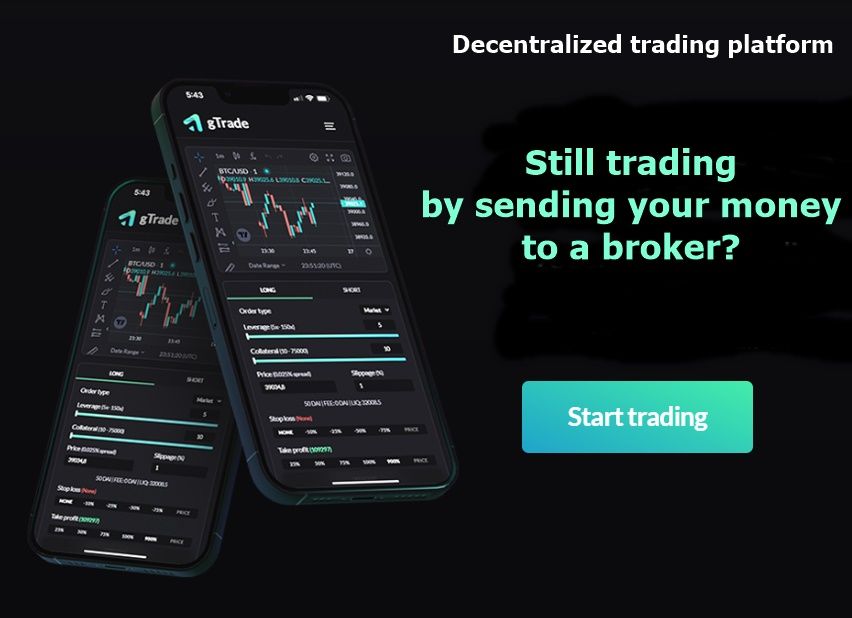A Guide To Decentralised Trading Platforms

Using decentralised trading platforms for stocks is something that has been around for a while. The concept is that investors and traders can use technology to help them make better trades. This can involve using a DEX, or a DEX aggregator. It can also involve using automated market makers, or Order books. Getting started with a decentralized trading platform can be difficult. There are so many options to choose from, and it’s hard to decide which one is right for you. Here are a few tips from 1d Sen Holding to help you find the best one for Forex, Cryptos and gTrade for Stocks.
Automated market makers
Unlike traditional order books, Automated Market Makers (AMMs) use a smart contract to determine the best price for an asset. They also use algorithms to automate the provision of liquidity for the trade. This can be a lucrative proposition for traders, but it comes with its fair share of risks.
AMMs have changed the way buyer-seller interactions are performed. In the past, humans were responsible for latency in price discovery and market manipulation. Generally, AMMs used complex strategies and a lot of resources to make their operations efficient. However, as the industry matures, they have become more reliable and profitable.
AMMs are a key part of the decentralized finance landscape. They eliminate the need for centralized financial institutions and their associated middlemen. The technology behind the AMMs is an algorithmic formula that regulates the price of an asset.
The AMMs have the potential to disrupt the traditional order book model. As such, a growing number of centralized exchanges have moved into the decentralized arena.
Order books
Using a decentralized order book solves a number of issues associated with centralized order books. It also provides a secure trading environment.
Order books are used by finance exchanges to compile buy and sell orders of assets. Currently, there are two main types of order books: centralized and decentralized.
An order book is a list of trade orders arranged by price. These trades are then listed in ascending order on the sell side and descending order on the buy side. The depth of an order book is determined by the spread between the bid and ask prices.
Order books are also used by derivatives markets. The New York Stock Exchange uses an order book to automatically pair buyers and sellers. The dYdX also uses an order book.
DEXs, on the other hand, are based on the blockchain. These platforms are designed to allow users to freely trade their assets. They are free from intermediaries. In addition, these platforms are feeless. However, they are subject to security risks and scams. Getting started with decentralised trading platforms can be difficult. There are so many options to choose from, and it’s hard to decide which one is right for you. Here are a few tips from 1d Sen Holding to help you find the best one.
DEX aggregators
Unlike traditional exchanges, DEX aggregators for stocks use multiple avenues to increase liquidity. This helps traders to exchange assets with lower fees. They also minimize slippage on large orders. These services are built directly on the blockchain.
To get started, you will need a wallet that is compatible with smart contracts. You will also need to make sure that your funds are held in the right tokens for each network. You may also need a photo ID to confirm your identity. You will then connect your wallet through a pop-up prompt on the website.
These aggregators are usually built on open source code. This gives developers the flexibility to adjust their codes to fit their needs. Besides, it allows users to view the code and see how they operate.
AMMs provide a secure way for transactions to occur without the need for an order book. This also reduces the impact of low liquidity. This means that investors can have more control over the trades they make. Moreover, they incentivize the supply of tokens in the liquidity pools.
Dash2Trade
Using the Dash2Trade decentralised trading platform for stocks, investors can develop their own crypto strategies and implement them in real time. This new system provides a host of powerful tools to analyze the market, identify emerging cryptocurrencies, and trade successfully.
The system also provides users with access to a dashboard that provides analysis insights on price movements. Traders can also use the Backtesting utility to simulate market conditions and receive alerts regarding risks. The dashboard also includes an on-chain analysis tool.
The Dash2Trade team has hired Ilyes Kooli, a longtime crypto market veteran, as its chief technology officer. He will be responsible for developing the Dash2Trade ecosystem. He will also help expand the reach of the project.
The platform will allow traders to interact and compete with other members of the community. The Dash2Trade ecosystem will also feature an exclusive Discord server. It will also offer regular trading signals.
The Dash2Trade token will power the entire platform. It will be available as an ERC-20 token on the Ethereum network.
Uniswap
Uniswap is a decentralised trading platform that supports Ethereum (ETH)-based tokens. Unlike normal centralized exchanges, Uniswap does not charge listing fees and allows users to list their own tokens. This gives Uniswap a competitive advantage.
Using Uniswap’s automated market maker (AMM) algorithm, Uniswap determines the effective price of a token based on supply and demand dynamics. Each trade impacts the market price. Tokens can be traded in either direction, and buyers do not have to wait for the opposite party to complete a trade. This makes it easier for traders to take advantage of the low prices of crypto assets.
The Uniswap protocol has evolved over time. Recently, the UNI governance token was introduced, which allows stakeholder involvement in protocol decision-making. It can be purchased on exchanges, and UNI token holders can vote for network policies.
Bisq
Traders can exchange their euros for bitcoins with Bisq. It is a decentralized platform which links traders and eliminates a middleman. It also has a dispute resolution system that is used to solve disputes.
It allows users to make offers, accept trades, and complete transactions with other users. It is also a secure platform that protects user privacy. It uses decentralized human arbitration to handle disputes. Its code is open source. It supports multiple altcoins such as DASH, DOGE, and ETH.
The trade process is a bit complicated. It involves four transactions published to the Bitcoin blockchain. There are three parties to the transaction: the seller, buyer, and arbitrator. The trade is successful when all three of them sign off.
Compound
Traders looking to leverage their ETH holdings can use Compound Finance to borrow against it. They can then purchase more ETH with the borrowed money and pay back the ETH to the lending platform with interest. This can be a smart strategy when considering the market.
Compound Finance is a decentralized protocol that allows users to lend cryptocurrencies without the need for an intermediary. Its interest rate is decentralized as well, and its floating rate varies according to market forces.
In a nutshell, Compound is a protocol that uses smart contracts to generate interest on loans. It also functions as a permissionless protocol, meaning that no one can shut down the system. However, it has had some critics. Nevertheless, it has managed to garner support from an impressive community of investors.
Bancor
Founded in June 2017, Bancor is a decentralised trading platform that allows users to trade micro cap coins. Its smart contract technology facilitates seamless transactions, removing the need for third-party intermediaries.
Bancor is built on the Ethereum and EOS blockchains. It also uses the EOS token EOS, and offers support for other cryptocurrencies. The protocol consists of a series of smart contracts that manage a range of liquidity pools. It offers automatic price discovery of tokens, making the exchange of virtual assets simple. It was launched with a $153 million token sale.
In addition to the smart contract technology, Bancor also offers impermanent loss insurance. This protects users from losses in case of a system glitch. The team has also introduced a bug bounty program.
Curve Finance
Founded by Michael Egorov, Curve Finance is an Automated Market Maker (AMM) exchange that offers users the opportunity to swap different cryptocurrencies. It also offers a return on coins.
AMMs use algorithms to price tradable assets. They then rebalance the pools after an exchange. The returns for a given asset can vary dramatically depending on the trading activity.
Unlike other AMMs, Curve’s pools are designed to ensure low slippage when exchanging digital currencies. This allows investors to avoid volatility and speculation.
There are seven pools on Curve’s platform. Each pool is limited to a specific type of asset. The pools are controlled by the AMM protocol, which is a smart contract.
PancakeSwap
Using an advanced BNB Chain architecture, PancakeSwap is built for speed and security. It allows users to swap and trade tokens. Its user interface is clean and simple. It is also one of the safer DEXs. The platform runs on a smart contract and it has low transaction fees. It supports BEP-20-based wallets.
To start using PancakeSwap, users must have a wallet that is compatible with the BEP-20 protocol. They can then create pairs of tokens. Once the pair is created, they can exchange tokens and earn CAKE tokens. These can be used to participate in lotteries or NFTs.
To participate in lotteries, users must buy a certain number of CAKE tokens. The lottery is held every six hours and matches are scored based on a four-digit combination. If a number is matched, a prize will be awarded.








